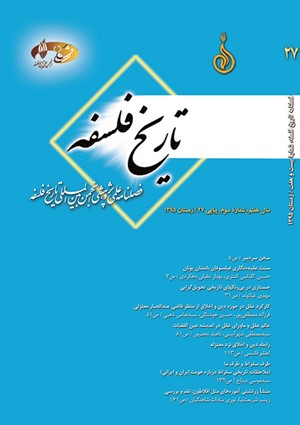طرف سقراط و طرف ما (ملاحظات تاريخي سقراط درباره هويت ايران و ايراني)
محورهای موضوعی : Connection of philosophers’ views and philosophical schools with the social and philosophical conditions of the time
1 - دانشگاه تهران
کلید واژه: سقراط افلاطون آلکيبيادس قوانين آيسخولوس کوروش هويت ايراني شعور تاريخي ايراني کنفرانس سقراط ,
چکیده مقاله :
پيشتر در مقالهيي تحت عنوان «انديشه ايران در انديشه سقراط (کنفرانس بزرگداشت فيلسوف يوناني سقراط، تهران/1380» استدلال نموديم که در مکالمات افلاطوني، تصريحي بر حق ملت ايران و نيز حق دولت ايراني ديده نميشود. سقراط که انتظار داشت ايرانيان حکومت آتن را برسميت بشناسند، در تأييد رسمي و باصطلاح دوژوري حکومت هخامنشي سخني بصراحت نميگويد. برغم اينکه افلاطون بيش از ديگر يونانيان با آزادمنشي از شاعران و نمايشنامهنويسان و مورخان ديگر ملتها و در اين ميان بيشتر از ملت ايران ياد ميکند، اما وي حقوق دموکراتيک آتنيها را مشروط به حفظ حقوق ملتهاي ديگر از جمله ايرانيها و مصريها و مشروعيت دولتهاي آنان نميداند. در نوشتار حاضر قصد ما اين است که ويژگيهاي خودشناسي آتني را در نسبت با خودشناسي ايراني تعريف و بازشناسي کنيم؛ افلاطون در اشعار خود گفته است: «سلام مرا به ساحلي که همسايه ماست برسانيد.» بتعبير فيلسوفانه آتن بايد به مرزها کشيده شود تا خود را دريابد، زيرا مرزهاي انديشه آتني و يوناني براي خودشناسي و مطالعه تاريخ ايراني اهميت دارد و همانگونه که سقراط خود به بيگانه اجازه داده بود، بيگانه ميتواند درباره ماهيت «حد»، از جمله حد و رسم انسانِ يوناني و غيرآن سخن بگويد. به ياد بياوريم زماني که فايدروس به سقراط گفته بود: «سقراط! چه آسان ميتواني راجع به مصر و هر کشور ديگر که بخواهي داستان بسازي». قصد ما در نوشتار حاضر، پيروي متقابل از سقراط در اين فقره نيست و نميخواهيم وارد انشاء اسطورهيي و داستاني و يا تاريخي درباره يونان سقراط بشويم، بلکه مقصود تفسير و تفصيل نظر سياسي سقراط درباره ايران بخصوص با رجوع به رساله آلکيبيادس و رساله قوانين است.
Previously, in a paper entitled Iranian Thought in Socratic Thought (presented in the “Conference on Commemorating Socrates, the Greek Philosopher”, Tehran, 2001), the writer of the present paper argued that in Plato’s dialogues, the rights of Iranians and the Iranian government have not been clearly stipulated. Socrates, who expected Iranians to officially recognize the government of Athens, does not explicitly talk about the official or de facto recognition of the Achaemenid government. Plato has spoken about the poets, playwrights, and historiographers of other nations, particularly those of Iranians, more freely than other Greek thinkers and scholars. However, he does not believe that Athenians’ democratic rights are conditioned by protecting the rights of other nations, including Iranians and Egyptians, and recognizing the legitimacy of their governments. The present paper is intended to define and review the features of Athenian self-knowledge and Iranian self-knowledge and compare them with each other. As Socrates himself considers it justified, strangers can also discuss the nature of “terms”, including the description of the characteristics of the Greeks. As we know, once Phaedrus told Socrates, “Yes, Socrates, you can easily invent tales of Egypt, or of any other country.” In this paper, the writer does not intend to copy Socrates’ approach in this regard; neither does he intend to provide a mythical, narrative, or historical account of the conditions of Greece during the time of this philosopher. Rather, he seeks to extensively explain and interpret his political view of Iran, specifically with reference to Alcibiades and Laws dialogues.
آيسخولوس، ايرانيان، ترجمه كامياب خليلي، 1356. #
افلاطون، دوره آثار، ترجمه محمدحسن لطفي، تهران، انتشارات خوارزمي، 1367. #
ايسرائيل، ژرار، كوروش بزرگ: بنيانگذار امپراتوري هخامنشي، ترجمه مرتضي ثاقبفر، تهران، انتشارات ققنوس، 1380. #
ديباج، سيدموسي، پرسش فلسفي ايراني بودن چيست؟ تهران، مرکز بازشناسي اسلام و ايران، چ 2، 1380. #
کلباسي، حسين، «مبادي پرسش سقراطي»، سقراط، فيلسوف گفتگو، تهران، 1381. #
گاتري، دبليو کي، سي، سقراط، زندگي و شخصيت، ديدگاههاي فلسفي، ترجمه حسن فتحي، تهران، انتشارات فکر روز، 1378. #
گزنفون، تربيت كوروش، ترجمه غلامعلي وحيد مازندراني، تهران، نشر افسون، 1379. #
گزنفون، خاطرات سقراطي، ترجمه محمدحسن لطفي، تهران، انتشارات خوارزمي، 1373. #
مجموعه مقالات، سقراط، فيلسوف گفتگو، مقدمه و اصلاحات سيدموسي ديباج، تهران، دفتر پژوهشهاي فرهنگي، 1381. #
هرودوت، تواريخ، ترجمه مرتضي ثاقبفر، تهران، نشر، اساطير، 1389. #
هومر، ايلياد، ترجمه جلالالدين ميركزازي، تهران، نشر مركز، 1383. #

